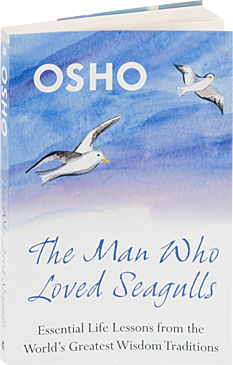The Man Who Loved Seagulls

The Man Who Loved Seagulls
Essential Life Lessons from the World?s Greatest Wisdom Traditions
Book — Also available in other formats: eBook
In The Man Who Loved Seagulls, Osho – himself a master storyteller – discusses essential stories and parables from the world’s great wisdom traditions of Zen, Taoism, Christianity, and Judaism. A powerful teaching tool, this collection of stories has been interpreted and applied to the concerns of modern day life making the valuable lessons it imparts both timely and universal. The stories encourage meditation as they are meant to be told and studied again and again, in order to discover new layers of meaning with each reading.
Topics include:
*The futility of chasing happiness
*The journey from fear to freedom
*The Zen approach to death and dying
*The extraordinary intelligence of innocence
Chapter Titles
#1: Walking the Tightrope
#2: A Story of Two Criminals and Their King
#3: Mere Players of a Game
#4: The Angry Samurai at the River Crossing
#5: Not Knowing Is the Most Intimate
#6: How Zen Master Hogen's Aimless Pilgrimage Brought Him Home
#7: Take No Notice
#8: The Story of a Housewife's Sudden Enlightenment
#9: Only the Gold
#10: The Brazen Thief in the Marketplace Ofch'i
#11: The Black-nosed Buddha
#12: How a Zen Nun's Worship Spoiled Her Beautiful Golden Statue
#13: The Man Who Loved Seagulls
#14: And Why They Stopped Playing with Him
#15: Looking for Treasure
#16: How Rabbi Eisik Got the Money for His Shul
#17: Neither Do I Condemn Thee
#18: The Angry Crowd and the Adulterous Woman
Details
Essential stories and parables from the world’s great wisdom traditions of Zen, Taoism, Christianity, and Judaism.
Excerpt from: The Man Who Loved Seagulls, Chapter 1
"Watch… somebody says he is a Mohammedan, somebody says he is a Hindu, somebody says he is a Christian, somebody says he is a Jew – their beliefs are different, but watch their lives and you will not find any difference. The Mohammedan, the Jew, the Christian, the Hindu – they all live the same life. Their life is not at all touched by their belief.
"In fact, beliefs cannot touch your life, beliefs are devices. Beliefs are cunning devices through which you say ’I know what life is’ – and you can rest at ease, you are not troubled by life. You hold a concept and that concept helps you to rationalize. Then life does not bother you much because you have all the answers to all the questions.
"But remember… unless religion is personal, unless religion is not abstract but real, deep in your roots, deep in your guts – unless it is like blood and bone and marrow – it is futile, it is of no use. It is the religion of philosophers not the religion of sages." Osho
In The Man Who Loved Seagulls, Osho – himself a master storyteller – discusses essential stories and parables from the world’s great wisdom traditions of Zen, Taoism, Christianity, and Judaism. A powerful teaching tool, this collection of stories has been interpreted and applied to the concerns of modern day life making the valuable lessons it imparts both timely and universal. The stories encourage meditation as they are meant to be told and studied again and again, in order to discover new layers of meaning with each reading.
Topics include:
*The futility of chasing happiness
*The journey from fear to freedom
*The Zen approach to death and dying
*The extraordinary intelligence of innocence
Chapter Titles
#1: Walking the Tightrope
#2: A Story of Two Criminals and Their King
#3: Mere Players of a Game
#4: The Angry Samurai at the River Crossing
#5: Not Knowing Is the Most Intimate
#6: How Zen Master Hogen's Aimless Pilgrimage Brought Him Home
#7: Take No Notice
#8: The Story of a Housewife's Sudden Enlightenment
#9: Only the Gold
#10: The Brazen Thief in the Marketplace Ofch'i
#11: The Black-nosed Buddha
#12: How a Zen Nun's Worship Spoiled Her Beautiful Golden Statue
#13: The Man Who Loved Seagulls
#14: And Why They Stopped Playing with Him
#15: Looking for Treasure
#16: How Rabbi Eisik Got the Money for His Shul
#17: Neither Do I Condemn Thee
#18: The Angry Crowd and the Adulterous Woman
Details
Essential stories and parables from the world’s great wisdom traditions of Zen, Taoism, Christianity, and Judaism.
Excerpt from: The Man Who Loved Seagulls, Chapter 1
"Watch… somebody says he is a Mohammedan, somebody says he is a Hindu, somebody says he is a Christian, somebody says he is a Jew – their beliefs are different, but watch their lives and you will not find any difference. The Mohammedan, the Jew, the Christian, the Hindu – they all live the same life. Their life is not at all touched by their belief.
"In fact, beliefs cannot touch your life, beliefs are devices. Beliefs are cunning devices through which you say ’I know what life is’ – and you can rest at ease, you are not troubled by life. You hold a concept and that concept helps you to rationalize. Then life does not bother you much because you have all the answers to all the questions.
"But remember… unless religion is personal, unless religion is not abstract but real, deep in your roots, deep in your guts – unless it is like blood and bone and marrow – it is futile, it is of no use. It is the religion of philosophers not the religion of sages." Osho
Details
More Information
Type Compilations
Publisher St. Martins Press, USA
ISBN-13 312388632
Dimensions (size) 140 x 207 mm
Number of Pages 272
- Log in to post comments
- 20 views
